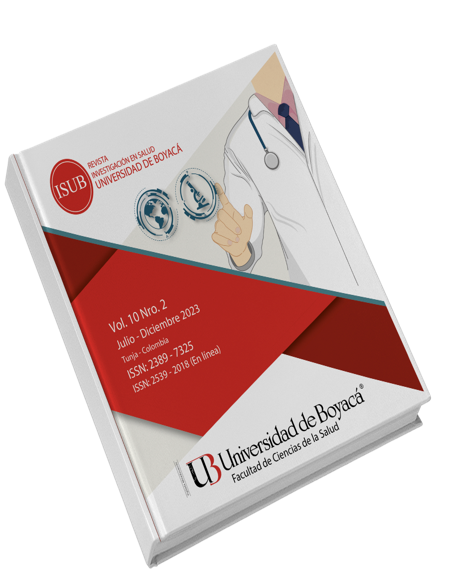Intoxicación por litio: a propósito de un caso
Lithium poisoning: A case report
Contenido principal del artículo
Resumen
Introducción: El litio es un medicamento estabilizador del ánimo, utilizado de forma principal para el tratamiento del trastorno afectivo bipolar y cuenta con una ventana terapéutica estrecha que facilita cuadros de intoxicación, lo cual es una causa importante de morbilidad y mortalidad.
Caso clínico: Hombre de 66 años con antecedente de diabetes mellitus, hipertensión arterial, insuficiencia renal crónica y falla cardiaca, en tratamiento crónico con carbonato de litio por trastorno afectivo bipolar. Consultó a urgencias por un deterioro neurológico progresivo secundario a intoxicación por litio. Se identificó litemia elevada (1,76 mEq/L) y se descartaron otras causas de deterioro neurológico. El paciente evolucionó de modo favorable posterior a la suspensión del medicamento y el uso de hemodiálisis.
Conclusión: La intoxicación por litio debe sospecharse en pacientes con uso crónico del medicamento que asisten a urgencias por síntomas neurológicos. La suspensión del medicamento, la corrección hidroelectrolítica y la hemodiálisis en casos indicados son el tratamiento de elección.
Palabras clave
Descargas
Datos de publicación
Perfil evaluadores/as N/D
Declaraciones de autoría
Indexado en
- Sociedad académica
- Universidad de Boyacá
- Editorial
- Universidad de Boyacá
Detalles del artículo
Referencias (VER)
Giunta R, Di Mario F, Greco P, Di Motta T, Maccari C, Parenti E, et al. Extracorporeal renal replacement therapies in lithium intoxication. G Ital Nefrol. 2020;37(3): 1-18.
Sun M, Herrmann N, Shulman KI. Lithium Toxicity in Older Adults: a Systematic Review of Case Reports. Clin Drug Investig. 2018;38(3):201-209. https://doi.org/10.1007/s40261-017-0598-9 DOI: https://doi.org/10.1007/s40261-017-0598-9
Giraldo JA, Berrouet MC, Cárdenas JF. Intoxicación por litio. CES Med 2016;30(1):129-134. https://doi.org/10.21615/cesmedicina.30.1.15 DOI: https://doi.org/10.21615/cesmedicina.30.1.15
Munteanu C, Rotariu M, Turnea M, Tătăranu LG, Dogaru G, Popescu C, et al. Lithium Biological Action Mechanisms after Ischemic Stroke. Life. 2022 Oct 22;12(11):1680. https://doi.org/10.3390/life12111680 DOI: https://doi.org/10.3390/life12111680
Haussmann R, Lewitzka U, Severus E, Bauer M. Correct treatment of mood disorders with lithium. Nervenarzt. 2017;88(11):1323-1334. https://doi.org/10.1007/s00115-017-0421-0 DOI: https://doi.org/10.1007/s00115-017-0421-0
Decker BS, Goldfarb DS, Dargan PI, Friesen M, Gosselin S, Hoffman RS, et al. Extracorporeal Treatment for Lithium Poisoning: Systematic Review and Recommendations from the EXTRIP Workgroup. Clin J Am Soc Nephrol. 2015;10(5):875-887. https://doi.org/10.2215/CJN.10021014 DOI: https://doi.org/10.2215/CJN.10021014
Mullins ME, Kraut JA. The Role of the Nephrologist in Management of Poisoning and Intoxication: Core Curriculum 2022. Am J Kidney Dis. 2022;79(6):877-889. https://doi.org/10.1053/j.ajkd.2021.06.030 DOI: https://doi.org/10.1053/j.ajkd.2021.06.030
Hoekstra R, van Alphen AM, Bosch TM. Lithium: only acceptable with careful monitoring. Ned Tijdschr Geneeskd. 2014;158:A7207.
Kalpakos T, Vermeersch G, Hendriks B, Vermeersch P. Complete atrioventricular block with diastolic mitral regurgitation due to severe lithium intoxication. A case report. Acta Cardiol. 2022;77(10):873-878. https://doi.org/10.1080/00015385.2022.2054493 DOI: https://doi.org/10.1080/00015385.2022.2054493
Kaczmarczyk I, Sułowicz W. Lithium nephropathy. Przegl Lek. 2013;70(6):397-399.
Kobylianskii J, Austin E, Gold WL, Wu PE. A 54-year-old woman with chronic lithium toxicity. CMAJ. 2021;193(34):1345-1348. https://doi.org/10.1503/cmaj.210725 DOI: https://doi.org/10.1503/cmaj.210725
Lobo MI, Amorim A, Cruz MD. Lithium toxicity beyond psychiatry - a case report. European Neuropsychopharmacology. 2021;53 (1): 444. https://doi.org/10.1016/j.euroneuro.2021.10.570 DOI: https://doi.org/10.1016/j.euroneuro.2021.10.570
Martínez MÁ, Sánchez LÁ, Sánchez MC, Sáez PR, Segura T. Lithium toxicity: The SILENT threat. Rev Psiquiatr Salud Ment. 2021;14(4):233-234. https://doi.org/10.1016/j.rpsmen.2021.11.001 DOI: https://doi.org/10.1016/j.rpsmen.2021.11.001
McLean MM, Sherwin H, Madabhushi V, Tilney PV. A 17-Year-Old Female Patient With a Lithium Overdose. Air Med J. 2015;34(4):162-165. https://doi.org/10.1016/j.amj.2015.04.010 DOI: https://doi.org/10.1016/j.amj.2015.04.010
Jacob JE, Chng WQ, Teo DB. Looking Beyond Numbers: Lithium Toxicity Within Therapeutic Levels. Am J Med. 2020;133(4):e155-e156. https://doi.org/10.1016/j.amjmed.2019.09.021 DOI: https://doi.org/10.1016/j.amjmed.2019.09.021
Greene S, AufderHeide E, French-Rosas L. Toxicologic Emergencies in Patients with Mental Illness: When Medications Are No Longer Your Friends. Psychiatr Clin North Am. 2017;40(3):519-532. https://doi.org/10.1016/j.psc.2017.05.007 DOI: https://doi.org/10.1016/j.psc.2017.05.007
Prisco L, Sarwal A, Ganau M, Rubulotta F. Toxicology of Psychoactive Substances. Crit Care Clin. 2021;37(3):517-541. https://doi.org/10.1016/j.ccc.2021.03.013 DOI: https://doi.org/10.1016/j.ccc.2021.03.013
Kavanagh C, Uy NS. Nephrogenic Diabetes Insipidus. Pediatr Clin North Am. 2019;66(1):227-234. https://doi.org/10.1016/j.pcl.2018.09.006 DOI: https://doi.org/10.1016/j.pcl.2018.09.006








